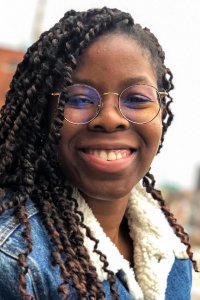Researchers With Game
Ohio Wesleyan Students Creating Video Programs to Measure Possible Brain Benefits



Name: Joy Buraima ’22
Hometown: Abidjan, Côte d’Ivoire
Majors: Neuroscience and Psychology
Minor: Spanish
Name: Isabelle Rodriguez ’21
Hometown: San Antonio, Texas
Majors: Neuroscience and Pre-medicine
Minor: Spanish
Name: Navami Shenoy ’23
Hometown: New Delhi, India
Major: Neuroscience
Minors: Computer Science and Business
OWU Connection Experience: Buraima, Rodriguez, and Shenoy are completing research titled “Examining Cognitive and Brain Functions through Video Games” under the mentorship of Kira Bailey, Ph.D., assistant professor of Neuroscience and Psychology. Their 10-week study is part of Ohio Wesleyan’s Summer Science Research Program (SSRP).
What We’re Studying
Buraima: “We are researching cognitive and brain functions through video game experience,” Buraima says. “To better understand the research surrounding video game consumption and its associated changes in video game consumption, we are designing a video game that replicates a cognitive control task (the Flanker test). The mundane nature of typical cognitive tests may influence performance and, as such, making them into action game versions may yield interesting results! Additionally, we get to develop a game that is designed specifically to test cognitive abilities through gameplay.”
Rodriguez: “Commercial video consumption has been associated to changes in cognitive control; however, they are not designed to train cognitive abilities,” Rodriguez adds. “We are researching how to create a video game that imitates a standard psychological task so that behavioral and brain data can be collected from participants which is closely associated to behavioral data from action video games.”
Shenoy: “Video game experience has been found to affect cognitive control – the process that allows us to make goals and work toward them,” Shenoy continues, “but the results are mixed. While some studies suggest that action video games improve cognitive abilities, others say that the games harm attention and cognition. This is because, unlike psychological tasks used in laboratories, commercial video games are not designed to test cognitive functions. So, we have no way of knowing what aspects of cognitive control are being affected by these games.”
What We Hope to Learn
Buraima: “We hope to learn more about research methods in the field as well as how best to produce valid results using atypical experimental set-ups. That kind of flexibility proves extremely valuable in a rapidly changing society (and field) like ours. The results we yield may help provide insight into the cerebral mechanisms responsible for specific goal-directed behavior and how well a video game setting is able to influence our ability to sustain attention for said goal-directed behaviors. Whatever answers we unearth may also have some relevant implications for the process of learning with regards to cerebral pathway biases.”
Rodriguez: “This research could be used to support the recommendation of using action video games to enhance visual attention and cognition.”
Shenoy: “The EEG (electroencephalogram) and behavioral data gathered from playing these games will eliminate the limitations posed by commercial games, and enable us to learn how gaming experience influences cognitive control. This knowledge can be useful in designing games that can improve specific cognitive functions in different groups of people, such as children, older adults, pilots, etc.”
How We’re Using Our Classroom Learning
Buraima: “The Quantitative Methods class I previously took aided greatly in better understanding the statistical aspects of the body of research I studied. I was also able to apply my understanding of brain function and behavior acquired in classes like Intro to Neuroscience, Behavior Modification, and Intro to Psychology. Participating in this research experience has kindled new interests within this field. The program has equipped me with a unique taste of research work, which is something I had always been curious about.”
Rodriguez: “This research enhances my classroom learning because I am actively learning how video game tasks are created which can potentially affect the brain in a positive way.”
Shenoy: “While working on the project, I found myself applying a lot of things I learned from my psychology and computer science classes. The reason I am so fascinated by computer science is because of how it can be used as a tool in studying neurological systems, and this research allows me to do just that. This project gives me a starting point to explore future research interests in neuroscience.”
Why We Chose Ohio Wesleyan
Buraima: “I found out about OWU through my major! I was looking for small schools that offered Neuroscience as a major, and OWU checked all my boxes. It also seemed to be international friendly, which was something that I considered extremely important.”
Rodriguez: “I knew from the beginning that I did not want to be a typical science student (with only science-related experiences). I wanted to have experiences that would be make me well-rounded; Ohio Wesleyan seemed like the best place for me to accomplish that. I also wanted to have small class sizes so that I had a better chance of connecting with my professors and my peers, as well as build my skills in all the various labs.”
Shenoy: “I chose Ohio Wesleyan because of its small size and great student-to-faculty ratio. OWU has a lot of opportunities in both the sciences and liberal arts, so I can pursue my interests in a variety of fields, including science, business, language, and culture.”
Our Plans After Graduation
Buraima: “I’m not quite sure yet – I’m still exploring my options as of right now! I am considering both medical school (for psychiatry) and graduate school (for neurolinguistics).”
Rodriguez: “After graduation, my plan is to attend medical school and eventually become a pediatric neurologist. My ultimate goal is to establish a clinic that directly benefits families of low income. I understand how quickly the medical bills can pile up, especially for a family with a child with a neurological disorder. I want to make sure that families of low income can obtain the same quality of health care as families of high income.”
Shenoy: “I would love to be a neuroscientist and devote my life to research. I plan on going to graduate school to get my Ph.D.”
